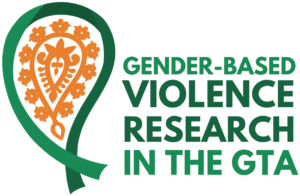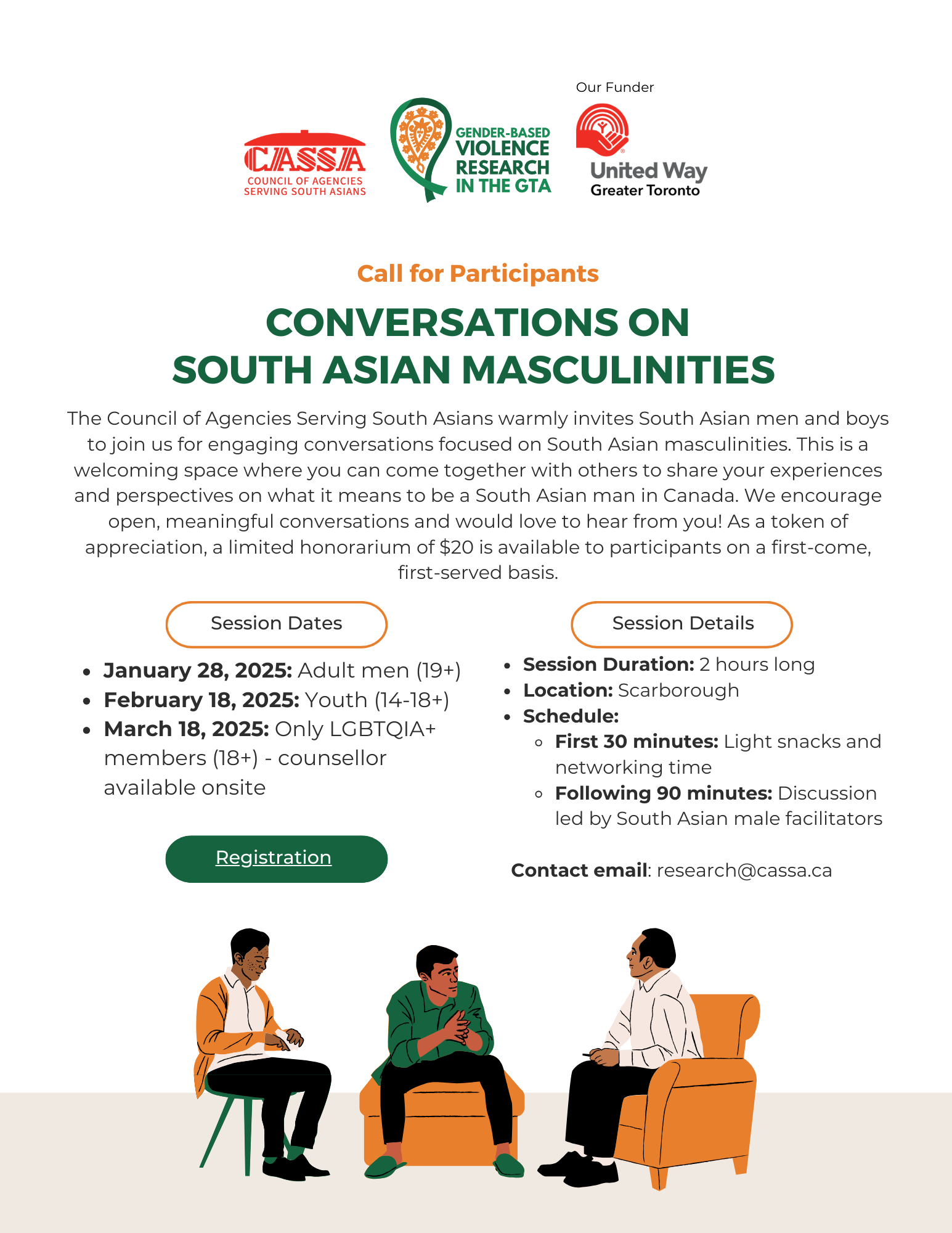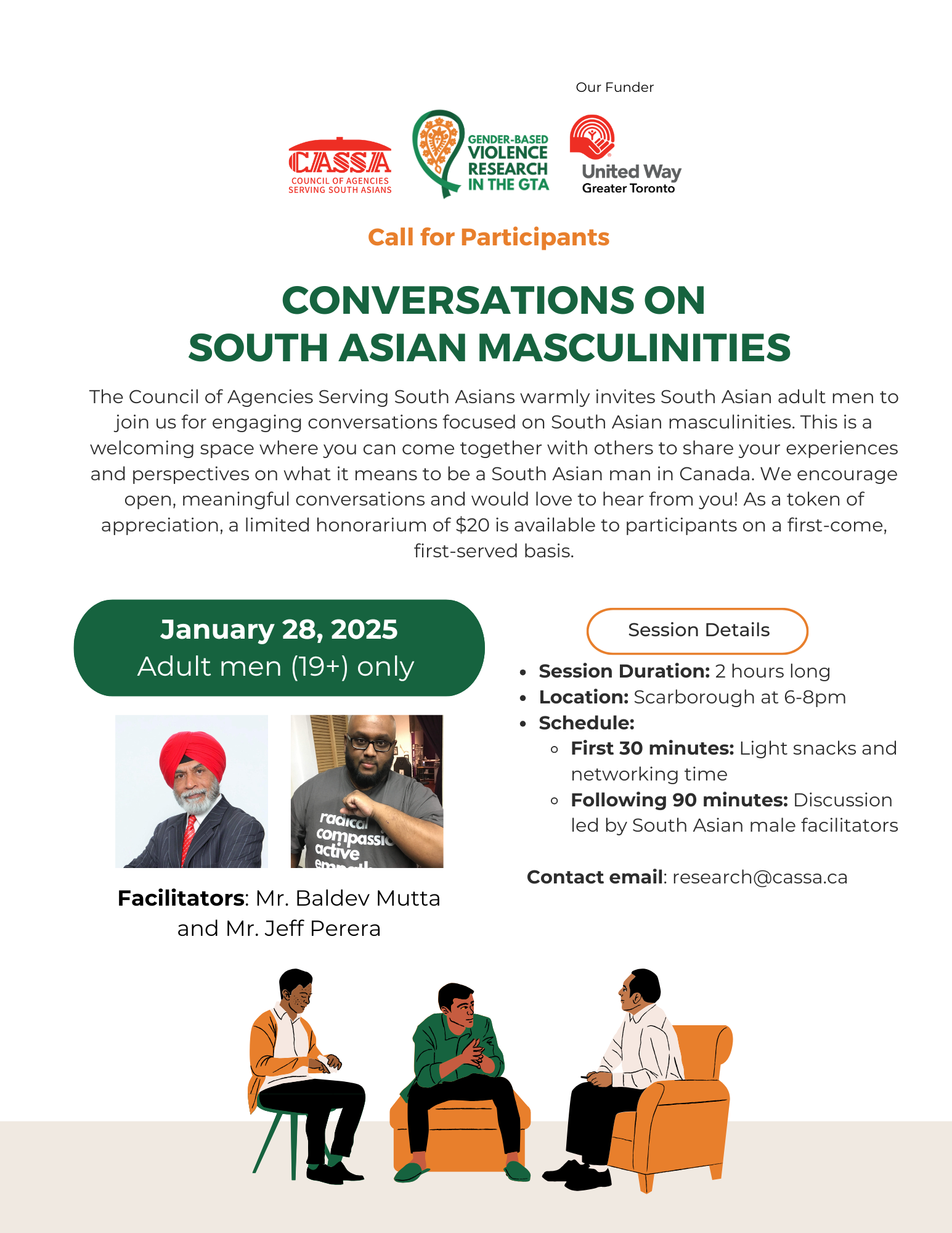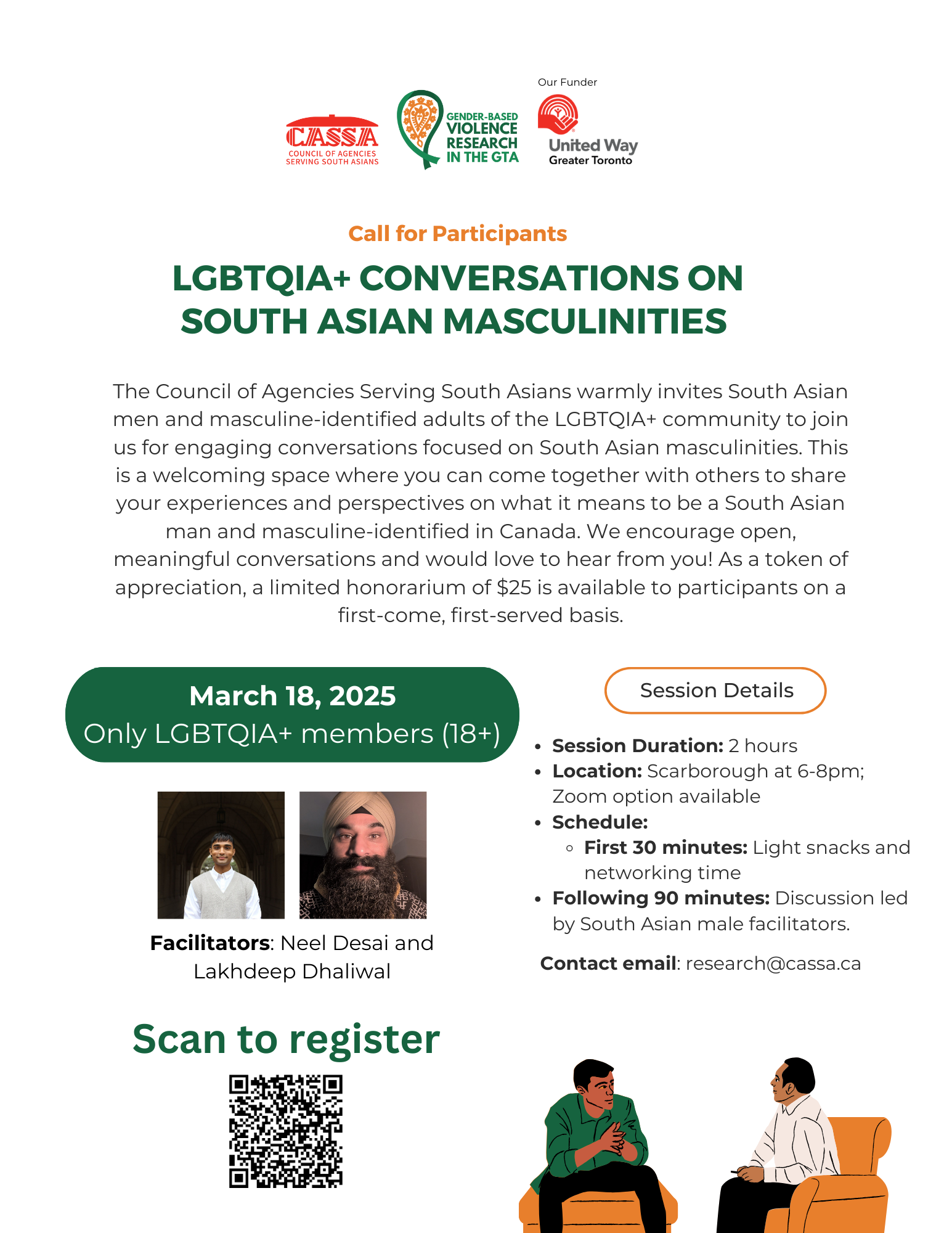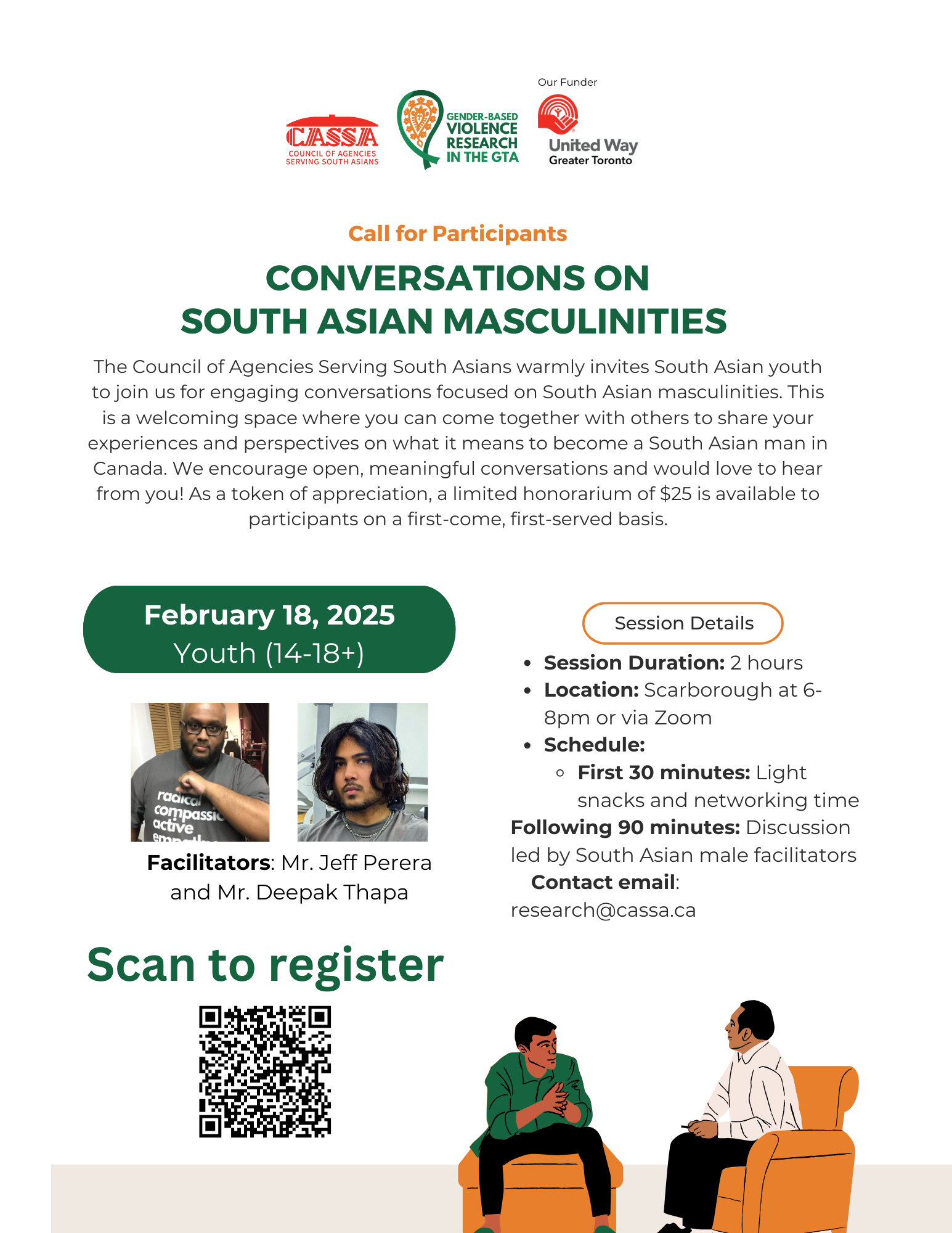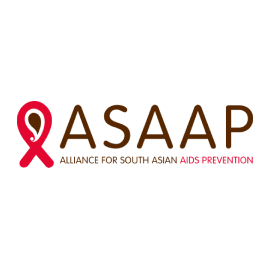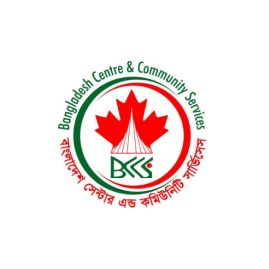What is the project about?
This community-based research project has been funded by United Way Greater Toronto to study toxic masculinity as it relates to and impacts gender-based violence (GBV). The project seeks to investigate how masculinity manifests within the South Asian community in Canada in both healthy and harmful ways, what factors cause this, and what culturally responsive intervention methods are available to help combat it.
Through collaboration with our partners in the Greater Toronto Area, the study aims to conduct primary research with survivors and offenders tied to GBV in the form of intimate partner violence (IPV) and family violence. Secondary research will also be conducted in the form of a literature review, which already reveals there is much work to be done in the space of understanding toxic masculinity within South Asian communities in Canada. The collected data will be utilized to inform culturally responsive intervention methods and best practices. It will also be used to provide training for service providers to equip them with the knowledge and context on the subject in order to provide culturally tailored services and support to survivors and offenders.
This project is a deliberate attempt to meld the lived experiences and knowledge of community members with experts, leaders, and academics to create a robust understanding of toxic masculinity and its causes. Topics of toxic masculinity and gender-based violence in the South Asian context in Canada are severely neglected in academia and community capacity building. CASSA aims to help bridge these gaps and create strong community resources.
Why is it important?
Toxic masculinity affects people of all genders and is associated with a greater risk of GBV in families or intimate relationships. Based on CASSA’s previous GBV study, the study has critically identified how GBV is a “silent pandemic” within the South Asian community in Canada, particularly impacting South Asian women. CASSA aims to dive deeper into this research, by investigating how toxic masculinity contributes to this “silent pandemic” towards women and queer-individuals, as primary research that investigates this relationship within the community in Canada, is limited.
Ongoing research has identified that toxic masculinity contributes to men and masculine-identifying individuals adopting harmful ideals, behaviours and practices based on rigid gender norms about what “real masculinity” looks like and how “real men” should behave and act. These harmful forms of expressing one’s masculinity has been identified to lead to violence, anger and GBV towards women, men, and members of the LGBTQ+ community. Such a relationship between toxic masculinity and GBV, has yet to be translated effectively into the context of the South Asian community. As such, conducting research with this community through a culturally-responsive and sensitive lens, is critical to understanding how masculinity can be an important site of intervention to combat GBV rates within the South Asian community.
What is “Toxic Masculinity”?
“‘Toxic masculinity’ does not imply that men are inherently violent, or that all men are toxic. The term refers to the expectations and restrictions society puts on men to define what a “man” should and shouldn’t be. Society defines “manliness” as the expression of strength, dominance, assertiveness, and power. Men are often forced to conform to stereotypes through bullying and peer pressure. To prove their “manliness,” men can end up hurting both themselves and others.”
-Canadian Women’s Foundation, 2018
Deliverables/Outcomes
This community-based research project on toxic masculinity aims to:
(1) Build a greater understanding and knowledge amongst service providers and their clients about toxic masculinity, its impact on GBV and IPV, and measures that can maximize safety and security for South Asian survivors,
(2) Acquire sector-wide knowledge from community and experts on toxic masculinity and GBV, and contextualize this collected data within the South Asian community,
(3) Increase knowledge and connection to resources for culturally responsive and community-centered intervention strategies, best practices, and training for addressing GBV and IPV cases,
(4) Raise general awareness within South Asian communities about toxic masculinity to foster community conversations to help combat future cases of GBV and IPV.
The Toxic Masculinity Report has been launched December 2024 with a full house of many organizations, service providers, and community members in attendance. The report may be below on this page. We are grateful to our research project team – Dinoba Kirupa as Project Manager, and our team consisting of Charito Grafilo, Shifa Abbas, Anoushka Anoushka, Rasnat Chowdhury, Neel Desai, Maryam Faisal, Manvinder Gill, Wardah Malik, Samson Mapile, Tom Robert, and Nozomi Shirakawa, whose contributions have furthered our ethics approval phase, data collection by way of creating research instruments and tools, data analysis, and report writing phases.
We are pleased to mention that this project was ethically approved by the Community Research Ethics Office (CREO) tied to the University of Waterloo. The project team members who supported the study during the ethics approval stage as well as research stages also attended the launch event and presented various sections from the report. We were fortunate to have Jeff Perera as the keynote speaker at the event where he spoke on healthy and toxic masculinities, and how we may help the community move in a positive direction. A panel of speakers who are also experts on masculinities spoke after Mr. Perera. The panel consisted of Gary Thandi, Dr. Chandrima Chakraborty, Dr. Sharifa Patel, and Rick Goodman who all shared wonderful insight.
The next steps for the Toxic Masculinity Project will be our dissemination and knowledge mobilization phase. A series of workshops will be held from January to March 2025 where community men and youth will be able to attend to discuss ideas of masculinities, relationships, and societal progress moving forward from here. We are grateful to our knowledge mobilization project team – Christina Tse, Karawee Shweazang, Ayesha Gonsalves, and Deepak Thapa – for their contributions to our virtual and in-person community outreach work and the report launch event.
Finally, the team is also working with Dr. Nazilla Khanlou as our Academic Supervisor in order to publish the report in a journal on community-based research.
Here is a glimpse into our social media campaign during our knowledge mobilization phase of the project

